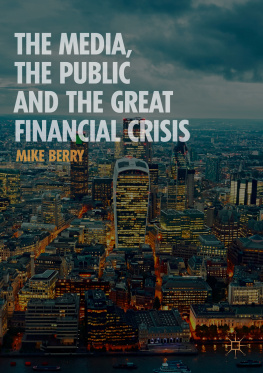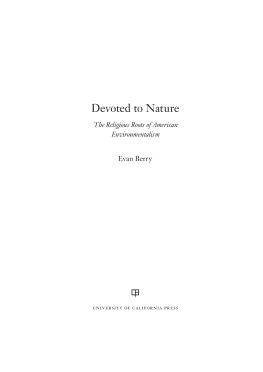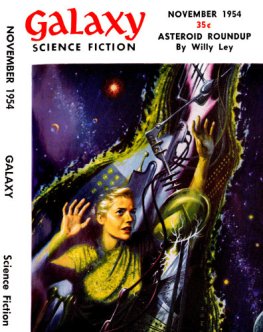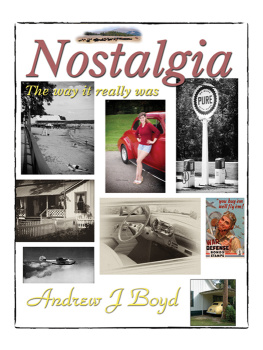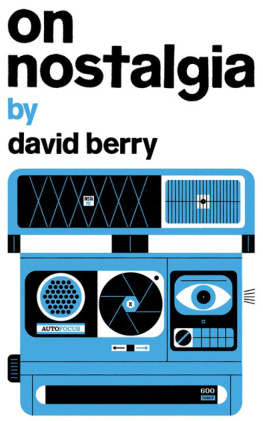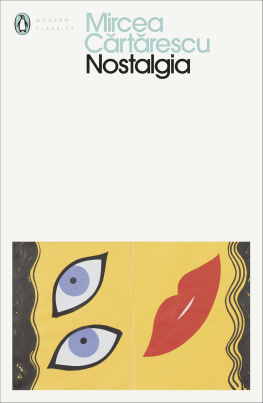copyright David Berry, 2020
first edition
Published with the generous assistance of the Canada Council for the Arts and the Ontario Arts Council. Coach House Books also gratefully acknowledges the support of the Government of Canada through the Canada Book Fund and the Government of Ontario through the Ontario Book Publishing Tax Credit.
LIBRARY AND ARCHIVES CANADA CATALOGUING IN PUBLICATION
Title: On nostalgia / David Berry.
Names: Berry, David (David M.), 1984- author.
Identifiers: Canadiana (print) 20200155253 | Canadiana (ebook) 20200155261 | ISBN 9781552454060 (softcover) | ISBN 9781770566231 (EPUB) | ISBN 9781770566330 (PDF)
Subjects: LCSH: Nostalgia.
Classification: LCC BF575.N6 B47 2020 | DDC 155.9dc23
On Nostalgia is available as an ebook: ISBN 978 1 77056 623 1 (EPUB), ISBN 978 1 77056 633 0 (PDF).
Purchase of the print version of this book entitles you to a free digital copy. To claim your ebook of this title, please email with proof of purchase. (Coach House Books reserves the right to terminate the free download offer at any time.)
Introduction:
Play It Once Again
I n the song Heaven, David Byrne sings about paradise as a place where nothing ever happens. Though it is not really nothing its nothing new. The band here plays his favourite song over and over, at the same party, and it ends with a kiss that, when it ends, will start again, will not be any different / will be exactly the same. I dont believe there is much of anything after we die, but if there is anything like heaven, I am not sure how it could be anything but our greatest hits maybe just our greatest hit on infinite repeat. Everything else carries the potential for disappointment; we cant know what we will like the most, only what we did like the most.
As with most Talking Heads songs, this is not a straight-forward endorsement. There is a folk theory that the proper way to understand the album that Heaven appears on, Fear of Music, is to add Fear of to each of the song titles: the benign nouns then become the paranoiacs fear of cities, fear of air, and, thus, fear of heaven. This sense of unease creeps into the lyrics, too: Byrne repeats, Its hard to imagine / That nothing at all / Could be so exciting / Could be this much fun. And of course the same perfect moment in perpetual loop is horrible: its death. Quite literally, if you believe in this kind of heaven, but obviously in the metaphorical sense, too. Nothing is so definitive until there is no more of it.
Heaven the song happens to feature in one of my best memories, a fuzzy soundtrack to wee small hours hazily enraptured, utterly unaware of what came before and what was to come, a moment so obvious I did not take note of it; it just seeped its way into me and has never bled out. But I am not here to get lost in my own nostalgia, even if this little anecdote probably explains far more about why I would pick this particular song than my explanation will.
There is in Heaven what I think of as the ultimate tension of nostalgia. It is a feeling that maybe feels too good, something that is so obviously appealing we cant help but be a little wary of it. We know it is severely limited, ending exactly when the kiss ends, leaving out every part before and after that either made it meaningful or cracked the moment. And yet no amount of rational defence can prevent it from returning, nor feeling every bit as right as it did the last time.
Its tempting here, for the sake of the parallel, to claim that its hard to imagine how something so obviously blinkered and ultimately impossible could grab a hold of us, but it isnt, even a little bit. Our lives are a relentless push forward, and even if the path ahead is bright and brilliant, it will be littered with loss. Everything is fleeting, everything must pass, and the idea that we might every so often stop and look back and hope more than anything that we could have even the smallest part of it back seems as natural to me as the fact that we will never, ever be able to.
Its this duality that draws me to nostalgia, the impossibility and the inevitability, the fact it just keeps happening even though it cant. There is some sense now, I think, that nostalgia is a more prominent, more powerful force now than it has ever been. That is probably true. But surely the desire to go back has been and will be with us for as long as we go forward surely theres a reason we made it possible to play the same song over again.
1
The Continuous Vibration of Animal Spirits:
On the Why of Nostalgia
N ostalgia has an air of total irreconcilability. There is the feeling the word describes, of course: a fundamentally impossible yearning, a longing to go back even as we are driven ceaselessly forward, pushed further away from our desire even as we sit contemplating it. But its the actual feeling, too, that ceaselessly resists any attempt to give it shape or sense. If we say we feel nostalgic, in general or about something in particular, it rarely needs an explanation, and there likely isnt a good one anyway: Why should it be the smell of our grandmothers cookies or the feel of a particular sweater or the sight of a certain tree in a certain playground, and not something else, that sends us searching backward? Why is it welling up now, on an otherwise unremarkable Tuesday? Why havent I felt this way for a long time? Why does it matter? And that assumes it even occurs to us to interrogate this sudden rush: one of nostalgias more persistent qualities is its ability to elide reason, to be felt deeply without prompting any further inquiry.
Its this strange aura of elusive profundity that makes nostalgia seem less like some sort of modern condition than a universal feeling that took us some time to put our finger on. If feelings in general are internal experiences that demand expression whether or not we have the means for it, our inability to actually do anything with nostalgia might be what kept it ineffable for so long. Most kinds of longing can be settled in one way or another, if not necessarily to the satisfaction of the yearner. Nostalgia can only be lived in or abandoned: it is yearning distilled to its essence, yearning not really for its own sake but because there is nothing else to be done. Maybe it resisted definition so long because naming it doesnt help resolve anything anyway.
Appropriately for the elusiveness of the concept, the word nostalgia did not originally mean what we now consider it to also appropriately, it was coined with a longing for a time when there was no word for what it described. Specifically: in 1688, a Swiss medical student named Johannes Hofer gave the name nostalgia to a malady he had noticed in young Swiss people who had been sent abroad chiefly mercenaries, one of Switzerlands prime exports at the time, though also household servants and others who found themselves in foreign regions. As was the style at the time in the nascent field of medicine more complicated than bleeding humours, Hofer used a portmanteau from an indistinctly highfalutin form of Ancient Greek: nostos roughly means home although it more often means homecoming, which incidentally was also the name for an entire subcategory of Greek literature, most notably the





